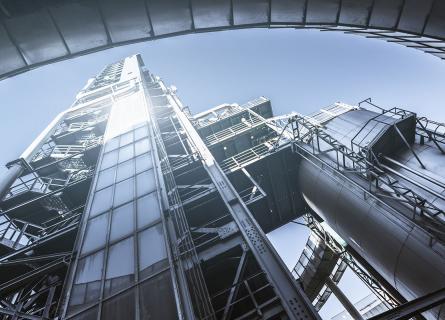
Driving sustainability and decarbonisation in the chemical industry: Chlorine Institute's centennial celebration highlights
Insights from Chlorine Institute's Annual Meeting in New Orleans
AFRY recently had the pleasure to attend the 100th Anniversary Annual Meeting of the Chlorine Institute in New Orleans.
This annual event brings together chemical industry leaders committed to the responsible and safe use and transportation of the chemicals that are, in one way or another, used to make almost everything we use or touch.
Sustainability and decarbonisation have been growing concerns among industry leaders. Katie Mencke and Dr Alexander Koukoulas from AFRY Management Consulting shared their perspectives, joined by AFRY colleagues at the conference.
Katie Mencke set the tone for the day with her speech on “Benchmarking for Sustainable Supply Chains”, highlighting the importance of partnerships and supply chain cooperation to reach net zero and minimise environmental and social impact over a product's entire life cycle. Key insights from her presentation include:
Paris Agreement dictates 43% carbon emissions reduction by 2030 and net zero by 2050 to limit global warming to +1.5℃
Brand owners have made decarbonisation commitments in line with the Paris Agreement that also include Scope 3 (or indirect supply chain) emissions.
To be good supply-chain sustainability partners for the brand owners, chemical suppliers need to understand their entire business ecosystem. This includes the sustainability performance of competitors, suppliers and customers; benchmarking is the perfect tool to gain this understanding.
Based on benchmarking results, chemical suppliers can develop sustainability goals and targets that meet customer expectations, find opportunities for sustainable growth and position themselves as key sustainability partners.

In “Decarbonising the Chemicals Industry: The Role of Small Modular Reactors in an Electrified Future,” Alexander A. Koukoulas, PhD, Director of Bioindustry, explored the critical intersection of science, policy and advocacy in shaping the energy landscape, the transition to renewable electricity and the role that nuclear energy can play to decarbonise the chlor-alkali industry. Here are the key takeaways:
- Urgency of decarbonisation: with atmospheric CO2 levels rising and climate change impacting global temperatures, there’s a growing imperative to decarbonise industries, particularly the hard-to-abate ones like the chemicals sector.
- Electrification strategies: the US is transitioning from fossil fuels to renewable energy. The shift towards electrification is seeing a build-out of renewable power generation and energy storage, with various strategies like Power Purchase Agreements (PPAs), Virtual PPAs (VPPAs), and direct ownership of renewable energy sources emerging as viable options to reduce Scope 2 emissions. How quickly the electrification of the transportation sector and the adoption of EVs could present a real strain on renewable power supply and the transmission grid. The US could require a doubling of electricity generation capacity by 2050 to meet net zero emission goals. The challenge is the availability of renewable power in the open markets, the intermittency of renewable power, which can be a problem for manufacturers that require uninterruptable power, and the cost of renewable power.

- Role of Small Modular Reactors (SMRs): The integration of SMRs, exemplified by DOW’s Seadrift Project, marks a significant step towards decarbonisation in heavy industries. SMRs offer a scalable, efficient, and low-emission energy solution, albeit requiring government support for widespread adoption. The modular approach to SMR design can deliver modules in the range of 80-300 MWe along with thermal energy. This scale is a great fit for many chemical production sites. However, SMR adoption faces some of the same challenges as the conventional nuclear industry. At large, the challenges facing SMR adoption. Nonetheless, the co-location of an SMR at a chlor-alkali plant would enable access to a reliable source of uninterruptable power.
- Biomass as a solution: heavy industry sees biomass as a practical approach to decarbonisation, either through biomass-to-energy or by substituting petroleum-derived materials with those made from biomass or a combination of both. Like energy from SMR, biomass-to-energy is an uninterruptable source of power. Chlor-alkali plants are generally located in those US regions where biomass is readily available.

Additionally, many chlor-alkali plants are located above or near regions that are suited for carbon sequestration. By coupling biomass energy and carbon capture and sequestration, chlor-alkali plants could become carbon-negative and generate additional revenues through credits and the sale of carbon credits.
Dr Koukoulas concluded by underscoring the imperative for collaborative efforts among policymakers, industry stakeholders, and technology innovators to drive the transition towards a sustainable, electrified future.
As we reflect on the discussions from New Orleans, it's clear that achieving a sustainable future demands concerted effort across the entire ecosystem of chemical production and use. AFRY remains committed to leading this charge, leveraging our global expertise and partnerships to drive meaningful change and take the industry towards net zero.

Bioindustry Management Consulting
Our service offerings, from corporate strategy to process design and from market insights to operational efficiency backed up by an understanding of best practices, detailed in-house databases, and analysis led by experts in the field, ensure your outstanding performance. We want to be your trusted partner.







